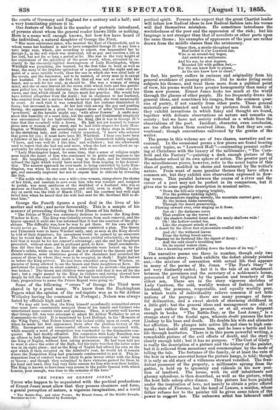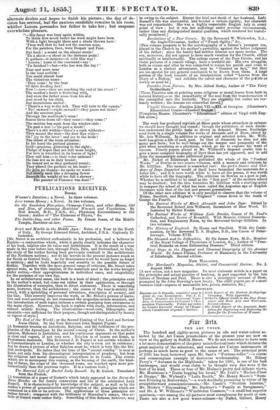THE POEMS OF ERNEST JONES. ° THOSE who happen to be
acquainted with the poetical productions of Ernest Jones must allow that they possess clearness and force, a genial perception of nature, a vigorous imagination, and a vivid
• The Battle-Day, and other Poems. By Ernest Jones, of the Middle Temple, Barrister-at-law. Published by Routledge.
' poetical spirit Persons who expect that the great Chartist leader will infuse low Radical ideas in low Radical fashion into his verses will find themselves mistaken. He sometimes introduces the wretchedness of the poor and the oppression of the rich ; but his language is not stronger than that of novelists or other poets upon the same theme ; his examples of oppressors of the poor are rather drawn from the middle classes than the aristocracy.
"Since then, a sterile-thoughted man Had lorded it o'er Leawood fair, Who as an errand-boy began, And ended as a millionaire.
And his son, by slow degrees, Mounted life with golden feet,—
For the son knew how to please, As the sire knew how to cheat."
In fact, his poetry suffers in raciness and -originality from his general avoidance of passing politics. Did he make living social subjects his themes, and treat them more from a political point of view, his poems would have greater homogeneity than many of them now possess. Ernest Jones looks too much at the world through the glasses of other people. He too, frequently draws his general ideas, and sometimes his images, from the common quar- ries of poetry, if not exactly from other poets. These general materials are animated and -varied by pictures fresh from life they exhibit inventions in which fancy and thought are found, together with delicate observations on nature and remarks on society ; but we have not society reflected as a whole from the observations of the poet. Incident, character, even conclusion, are too often taken from received ideas. In fact they are con- ventional; though conventions enlivened by the genius of the writer.
The poems in this volume are of two classes, narrative and oc- casional. In the occasional poems a few pieces are found bearing on social topics, as "Leawood Hall"—contrasting peasant suffer- ing at Christmas with the luxury of the millionaire ; "The Corn- field and the Factory "—painting a dark enough picture of the Manchester school in its own sphere of action. The greater part of the miscellaneous pieces, however, refer to the usual topics of this class of poetry, modified in choice and treatment by the writer's nature. From want of more peculiar themes they have often a common air, but they exhibit nice observation expressed in flow- ing verse. This parallel between the course of a river and the career of a poet may not be perfect in its comparison, bat it gives rise to some graphic, description in musical metre.
"Down the hill-side tripping brightly, O'er the pebbles tinkling lightly, 'Mid the meadows rippling merrily, the mountain current goes ; By the broken rocks careering, Through the desert persevering, Flowing onward ever, ever singing as it flows.
But oh ! the darksome caves That swallow up the waves ! Oh! the shadow-haunted forest and the sandy.shallows 'wide!
Oh! the hollow-reeded fen, Like the stagnant minds of men, A desert for the silver foot of,niountain-cradled tide!
And oh! the withered leaves From the fading forest-eaves, Presibigen its forehead like the signet of decay ; • And the cold cloud's troubling tear On its crystal waters clear, Like a haunting sorrow gliding down the future of its way."
The narrative poems are three in number, though only two have a complete story. Each exhibits the defect already pointed out,—the mixture of convention with actual life that appears in many of the poems of Mr. Jones. "The Peer's Story" is not very distinctly ended ; but it is the tale of an attachment between the governess and the secretary of a nobleman's house, persecuted if not blighted by the passion and treachery of the eldest son. There are in the story vigorous sketches of Lady Caerleon, the cold, worldly woman of fashion, and her husband, the pompous, respectable, and equally worldly peer, in which traits of individuality relieve common if not trite notions of the peerage ; there are many passages of force- ful delineation, and a sweet sketch of charming childhood in a little girl; but the general ideas and management are old ; of the past rather than the present, or at all events frequent enough in books. "The Battle-Day, or the Lost Army," is a strange story of the feudal ages, wherein doubt pursues the hero Lindsay to his bane and death. He doubts his wife and alienates her affection. He plunges into active life and rises to high com- mend; but doubt still pursues him, and he loses a battle and his life through hesitation. There is in this poem powerful writing, a remarkable picture of the evil effects of doubt, and the story is clearly enough told ; but it has no purpose. "The Cost of Glory" is really the description of a picture and the history of the painter, but it is relieved from monotony and commonplace by the mode of telling the tale. The fortunes of the family, or at least the ruin of the heir in whose ancestral house the picture bangs, is told; though it is only an old story of a villanou.s steward versified. The frau- duknt possessor of the property, a millionaire sprung from the ,gutter, is held up to ignominy and ridicule in his new posi- tion of landlord. The house, with its stiff inhabitants and gloomy splendour, is then described, as well as the picture, when the host falls asleep after dinner. This picture has been painted under the inspiration of love, not merely to obtain a prize offered by the state of Florence, but the hand of Lenora, a maiden, whose father refuses her to the painter till he gives some token of the power to support her. The unknown artist has laboured amid alternate doubts and hopes to finish his picture ; the day of de- cision has arrived, but the anxious candidate remains in his room, whither Lenora persuades her father to take her ; but suspense
overwhelms pleasure.
"—His fancy was busy again within, To think how much better his work might have been With a light brought there and a shade thrown here : 'Twas well that he had not the canvass near, For the painters, then, were Despair and Fear.
But bark! a sound on the silence steals !
'Tie a shout—a shout in the distance peals !
It gathers—it deepens—it rolls this way ! 'Lenora! haste to the casement—say !
'Tis finished I—but—who has won the day ? '
Near and more near Is the loud acclaim : You could almost hear The victorious name: `They come! by the beat Of their flooding feet!
Now I—now—they are reaching the end of the street!'
The maiden's heart is fluttering wild, And even the father arose Irons his seat And stood by his child, But incredulous smiled : There's a way to the left. They will turn to the square.'
4
No! onward !—right onward I—they pause not there! And the senators pass Through the multitude's mass ! • Scarce three doors off—they come!—they come !'
The maiden has sunk from the window-side : 'Tis past a fear !—'tis• past a doubt!
There's a stir within—there's a rush without— They mount the stair—the door flies wide—
Oh ! joy to the lover ! and joy to the bride ! The eldest of the train advances: In his hand the garland glances ; Gold—precious, glittering to the sight; Pledge of hopes that are still more bright, • For love is wreathed in its leaves of light! - They call him:—is their voice unheard ? He rose not as in duty bound; He bowed not as they gathered round; They placed the garland on his head— He gave no thanks—he spoke no word— . But slawly sank like a drooping flower Beneath the weight of too full a shower : The painter of Florence was dead !"



























 Previous page
Previous page